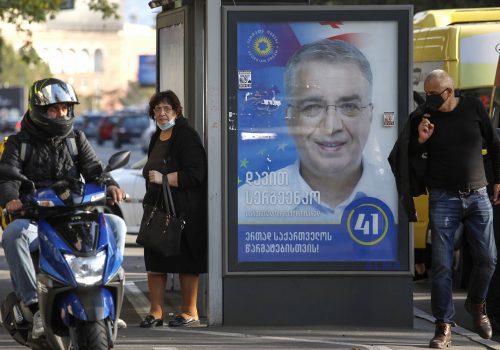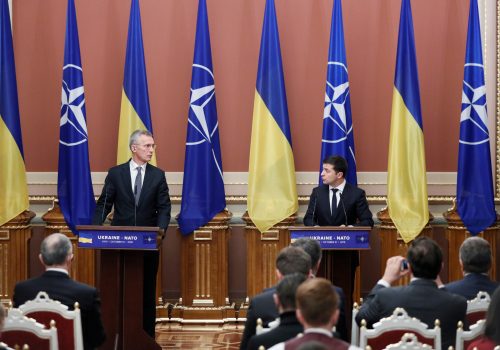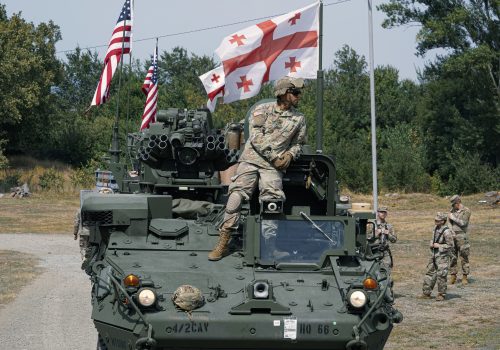Experts react: What’s behind the crisis in Georgia?
Georgia is once again in a political crisis.
On February 23, Georgian police broke into the offices of the United National Movement (UNM) opposition party to arrest UNM leader Nika Melia on what his team says are politically motivated charges. Melia was arrested shortly after former Georgian Defense Minister Irakli Garibashvili assumed the office of prime minister—after his predecessor, Giorgi Gahkaria, resigned over plans to arrest Melia. After protests broke out over the arrest, Garibashvili issued a statement proposing that “all reasonable opposition forces enter parliament so that we may use the country’s legislature as the main platform for discussion.”
Melia’s arrest is the latest in a series of political disputes in Tbilisi, stemming from last fall’s parliamentary elections. International observers called the elections flawed but ultimately legitimate. Many opposition groups, including UNM, rejected the results as fraudulent and have refused to take their seats in parliament despite the urging of the Parliamentary Assembly of the Council of Europe (PACE) that they take their seats in the Georgian parliament.
Below, experts react to this week’s news and what it means for Georgia’s future:
Georgia needs de-escalation from all parties
Over the past 18 years, Georgia has emerged as a raucous democracy that at times appears to tilt back in an authoritarian direction. That tilt has been more prominent at times in the past few years. Last year, Georgian Dream and the United National Movement reached an important compromise on election reform for the parliamentary elections. While competent international observers called those elections flawed, but not irreparably so, UNM unfortunately chose not to accept their legitimacy. Today the Georgian government chose to arrest UNM leader Nika Melia on charges dating back to the controversial events surrounding the riots that broke out when Russian parliamentarians addressed the Georgian parliament two years ago. While Georgian authorities claim that the arrest was a matter of simple justice, it looks much more like political payback. It is surprising that they took this step, particularly after Prime Minister Gakharia stepped down rather than preside over Melia’s arrest. The Georgian government should release Melia immediately and seek democratic means to manage its political competition with UNM. Georgia’s NATO and EU aspirations are worthy of support since it is a democratic state. But if it slides back into authoritarianism, the case for Georgia is much-diminished.
Ambassador John Herbst, director of the Atlantic Council’s Eurasia Center
The West’s task is to de-escalate the crisis
The arrest of Nika Melia makes an already tense political environment worse, but on its own is not a dramatic change in Georgia’s political situation. This arrest, but equally importantly the boycott of Parliament by political parties after losing a flawed but reasonably legitimate election, is part of the larger context of democracy in Georgia being stalled for several years now.
It is immediately clear what the US can do. The arrest of Melia is ultimately a reasonable and defendable, if not exactly wise, move by the government. Additionally, the West has weakened its position by seemingly never recognizing the reality of criminality around some in the United National Movement. Both sides in Georgia, as well as Western powers like the US, should focus not on proving they are right—whatever that means—but on finding ways to de-escalate.
Lincoln Mitchell, adjunct research scholar at Columbia University
Sign up for the latest from the Eurasia Center
Stay up-to-date with events, news, and publications for all of Eurasia with the Eurasia Center’s weekly newsletter.
Georgia’s democracy is at stake
Georgia’s freedom and democracy are at stake today. The country is choosing between democratic values and rule of law on the one side and authoritarianism and unfreedom on the other. Georgians made their choice for democracy and a Euro-Atlantic future a long time ago. For this reason, ordinary citizens were defending the leader of the opposition at his office. They understand that building strong and independent institutions is the only right path for the country. The people’s choice is under threat, regrettably, because of a ruling party that does not demonstrate the will to resolve the crisis and harms the country’s reputation. Due to political persecutions, an assault on independent media, and backsliding on democracy, Georgia’s membership in Euro-Atlantic institutions will be put in question—and it will be the interests and future of the Georgian people that will suffer.
Eto Buziashvili, Caucasus research associate at the Atlantic Council’s Digital Forensic Research Lab
Georgian Dream wants closer ties with Russia—this is the next step
Georgia is ruled not by the president or prime minister, but by Georgian Dream party chairman Bidzina Ivanishvili, a billionaire businessman who lives in an imposing compound above Tbilisi. Georgian Dream’s electoral success in recent years has gone hand-in-hand with a crackdown on dissent. Nika Melia became a prime target after he led the “Gavrilov night” protests in 2019 to protest against the visit of a Russian MP, Sergei Gavrilov, who was invited to speak to Georgia’s parliament. Many Georgians, remembering the Russo-Georgian war of 2008, objected. However, Georgian Dream has long wished for closer relations between Georgia and Russia, feeling that they are in the best interest of the country. Bidzina Ivanishvili also made his fortune in Russia.
Tuesday’s actions stem from that June night in 2019. Georgian Dream has repeatedly accused Melia of launching a “coup.” He was found guilty and placed under house arrest. In 2020, Melia took off his arrest bracelet and helped to lead protests against Georgian Dream’s alleged stealing of the recent parliamentary elections. Appointed chairman of the opposition UNM party, Melia provides strong leadership and continues to be persecuted by Georgian Dream, which appears to be turning into an authoritarian nightmare. This is only one step in an ongoing process, but it appears to be attracting a far more high-level rebuke from the Biden administration than previous steps received from the Trump administration.
Mitchell Orenstein, professor of Russian and East European Studies at the University of Pennsylvania and senior fellow at the Foreign Policy Research Institute.
Eurasia Center events

Georgia’s top oligarch is the country’s chief obstacle
This crisis is the culmination of Bidzina Ivanishvili’s long-held and publicly expressed belief that his oligarchic vision for the country requires reformation of the political opposition to his tastes. The acknowledgment by former Prime Minister Gakharia of the politicization of law enforcement, and his resignation over it, should clarify that the governing decision-maker is Ivanishvili. If the Western aspirations of the Georgian people are to be realized and the will to defend democracy within Russia’s neighbors still exists, then intervention cannot be limited to the government and opposition, or supporting media and NGOs, but directed at Ivanishvili specifically.
Luis Navarro, Eurasia program fellow at the Foreign Policy Research Institute
Georgians won’t tolerate a democratic backslide
While Melia’s arrest is alarming, the bright side is that the Georgian people have been here before. When I was in Georgia in 2003, Georgians took to the streets after numerous irregularities in that year’s parliamentary elections. Former and late president Eduard Shevardnadze was seen as an entrenched figure who many did not see leaving power outside of dying. Hundreds of thousands of people took to the street and peacefully forced his removal. There are very few nations in the former USSR that can match the independent spirit of the Georgian people. Yes, this is a bad situation and the US should engage Prime Minister Irakli Garibashvili’s government and remind him of its commitment to democratic values with forceful diplomacy. But, again, as someone who has lived in the country and witnessed the Rose Revolution, if any nation’s people can mobilize themselves against a backslide in democracy, it is the Georgians.
Also, the “good news” is that it does not appear that the Kremlin is creating this drama.
Georgia is arguably the most stable democracy in the Caucasus. Armenia’s democracy is strong, but perhaps messier than Georgia’s. Azerbaijan is authoritarian. Then you have Russia, Georgia’s northern neighbor, that is authoritarian and has its troops in 1/5 of Georgia’sterritory. Through it all, Georgia has managed to hold itself together—sometimes barely.
Though Georgia is backsliding, it is in better shape than any of the aforementioned nations. For America, keeping Georgia politically stable is of great importance. Georgia is not a full democracy, to be sure, but the progress it has made since 2003 can’t be taken for granted or be allowed to backslide to pre-Rose Revolution years. Nothing would please the Kremlin more than to see an unstable Georgia whose political situation can be easily manipulated.
Terrell Jermaine Starr, nonresident senior fellow at the Atlantic Council’s Eurasia Center and senior reporter at The Root
Georgia‘s hardliners need to compromise
Georgian politics is in a deadlock and has been since late November-December 2020 when the political parties failed to reach any agreement in four rounds of talks over electoral disputes. Georgians found themselves in a deadlock because the opposition was too quick to jump to a total boycott of the new parliament and the ruling Georgian Dream party was too slow and inefficient to respond to valid grievances—and neither party was willing to compromise.
In the last two to three months, all major political parties, including Georgian Dream, have seen shifts in leadership and internal turbulence. Both in Georgian Dream and in the United National Movement, hawkish members came to leadership and the logical result is further escalation. Arrest of a major opposition leader is a bad move, especially in a crisis like Georgia now faces—and the inevitable tensions and protests that will follow are clearly the government’s responsibility. However, all sides must take a step back and take their share of responsibility.
The Georgian public is tired and apathetic. A public opinion poll published in December 2020 showed that 54% of voters believe no party represents their views. In a situation like this, even the proposed snap elections are not a panacea. Georgia needs compromise and a power-sharing agreement between both sides, and that is what international partners should urge all sides to do.
Nino Ghvinadze, nonresident senior fellow at the Atlantic Council’s Eurasia Center
Further reading:

The Eurasia Center’s mission is to promote policies that strengthen stability, democratic values, and prosperity in Eurasia, from Eastern Europe in the West to the Caucasus, Russia, and Central Asia in the East.
Image: Georgian law enforcement officers enter the United National Movement (UNM) opposition party office in Tbilisi, Georgia, on February 23, 2021. (REUTERS/Irakli Gedenidze)


